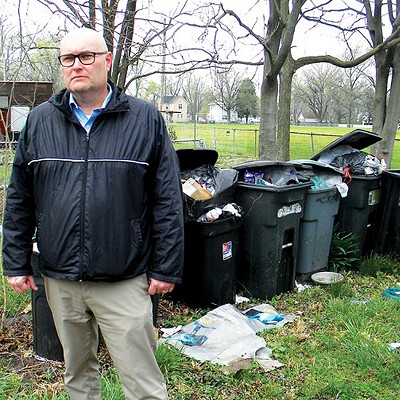For 23 hours a day, a roughly
five-by-ten-foot concrete box is what Aaron Fillmore calls home. He’s been
living in a room like that for the past 15 years.
That’s
according to a lawsuit filed last week by the Uptown People’s Law Center (UPLC)
against the Illinois Department of Corrections (IDOC). It claims Illinois turns
to solitary confinement as a punishment too readily and for too long.
Fillmore
is one of three inmates the UPLC is suing on behalf of. The lawsuit claims that
the way Illinois uses solitary confinement constitutes cruel and unusual
punishment. They want the state to adopt a set of standards for solitary
confinement created by the American Bar Association.
Larry
Foutch spent eight years in solitary confinement at Tamms Correctional Center;
a super maximum security prison made up entirely of isolation units. He said
after the first few years with limited human contact, he started noticing
something was wrong. He recounted an incident during his yearly physical. When
the nurse touched him to take blood it made him feel unusually nervous.
“Instantly
this anxiety came over me. It was like a panic attack started hitting me,”
Foutch said “I got woozy and lightheaded, and I started to pass out.”
Tamms
closed in 2013 after numerous human rights groups complained about conditions
in the prison. Although he has been out of the Tamms facility since 2006,
Foutch said the psychological impact of his time there lingers and that the
lasting effect of his isolation have become an obstacle to surviving on the
outside.
“I’ll
have problems probably the rest of my life, I’m sure,” he said. “There’s very
few jobs that I can work because I can’t be around numerous people.”
Brian
Nelson, prisoner’s rights coordinator with UPLC, is himself a former resident
of Tamms for 12 years. He said he entered the facility never having seen a
psychiatrist, but left needing five different types of psychiatric medication
just to sleep. He said everyone has their own coping method for dealing with
the lasting effects of their isolation.
“We all have a little closet somewhere.”
Nelson said. “I’ve got a place in the basement where I go hide – its pitch
black, and I can just sit there and I cry.”
Foutch
and Nelson both expressed a concern that though the psychological impacts were
very real to them, they are somewhat invisible to the people around them.
“Every
one of us that comes out of there, we’re your next door neighbors,” Nelson
said. “And nobody will know that I suffered this unless I tell them.”
Former
inmates are not alone in their assessment of the psychological effects of
isolation. Juan Méndez, who wrote a report for the UN on various forms of
torture, said in his 2011 report that after 15 days, solitary confinement
becomes what he calls “prolonged solitary confinement.”
“It
is at that point … that some of the harmful psychological effects of isolation
can become irreversible,” Méndez said in presenting his report.
Méndez
said the psychological impact of prolonged solitary confinement hurts the
ultimate goal of preparing inmates to re-enter society.
In
announcing the lawsuit, UPLC executive director Alan Mills made specific
mention of the UN report, which classifies segregation from other prisoners for
15 days or longer as torture.
“Illinois
does not keep people in segregation for 15 days,” Mills said. “Often we will
see people who have been in segregation for 15 years in Illinois.”
Mills
said that prisoners sent into solitary confinement are often denied due process
to challenge their additional punishment. He also said prisoners could be sent
to isolation for almost anything, including insubordination or possessing “drug
paraphernalia” which in the prison system could amount to an apple.
A
representative of the Department of Corrections said that they were reviewing
the case, but they had no comment.
“As
with every case we file, we hope that the department will sit down and discuss
things with us and try to resolve this matter,” Mills said. “But if not, we are
fully prepared to litigate this.”
Contact
Alan Kozeluh at [email protected].




















